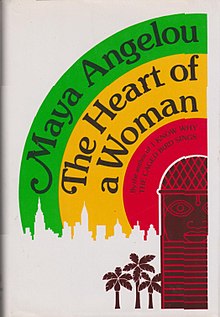 First edition cover | |
| Author | Maya Angelou |
|---|---|
| Language | English |
| Genre | Autobiography |
| Publisher | Random House |
Publication date | 1981 |
| Publication place | United States |
| Media type | Print (hardback & paperback) |
| Pages | 336 pp (hardcover 1st edition) |
| ISBN | 978-0-8129-8032-5 (hardcover 1st edition) |
| Preceded by | Singin' and Swingin' and Gettin' Merry Like Christmas |
| Followed by | All God's Children Need Traveling Shoes |
| Website | www |
The Heart of a Woman (1981) is an autobiography by American writer Maya Angelou. The book is the fourth installment in Angelou's series of seven autobiographies. The Heart of a Woman recounts events in Angelou's life between 1957 and 1962 and follows her travels to California, New York City, Cairo, and Ghana as she raises her teenage son, becomes a published author, becomes active in the civil rights movement, and becomes romantically involved with a South African anti-apartheid fighter. One of the most important themes of The Heart of a Woman is motherhood, as Angelou continues to raise her son. The book ends with her son leaving for college and Angelou looking forward to newfound independence and freedom.
Like Angelou's previous volumes, the book has been described as autobiographical fiction, though most critics, as well as Angelou, have characterized it as autobiography. Although most critics consider Angelou's first autobiography I Know Why the Caged Bird Sings more favorably, The Heart of a Woman has received positive reviews. It was chosen as an Oprah's Book Club selection in 1997.[1]
Critic Mary Jane Lupton says it has "a narrative structure unsurpassed in American autobiography" and that it is Angelou's "most introspective" autobiography.[2] The title is taken from a poem by Harlem Renaissance poet Georgia Douglas Johnson, which connects Angelou with other female African-American writers. African-American literature critic Lyman B. Hagen states, "Faithful to the ongoing themes of survival, sense of self, and continuing education, The Heart of a Woman moves its central figures to a point of full personhood".[3] The book follows Angelou to several places in the US and Africa, but the most important journey she describes is "a voyage into the self."[4]
- ^ Minzesheimer, Bob (26 March 2008). "Maya Angelou celebrates her 80 years of pain and joy". USA Today. Retrieved 11 January 2014.
- ^ Lupton (1998), p. 118.
- ^ Lupton (1998), p. 117.
- ^ Lupton (1998), p. 119.